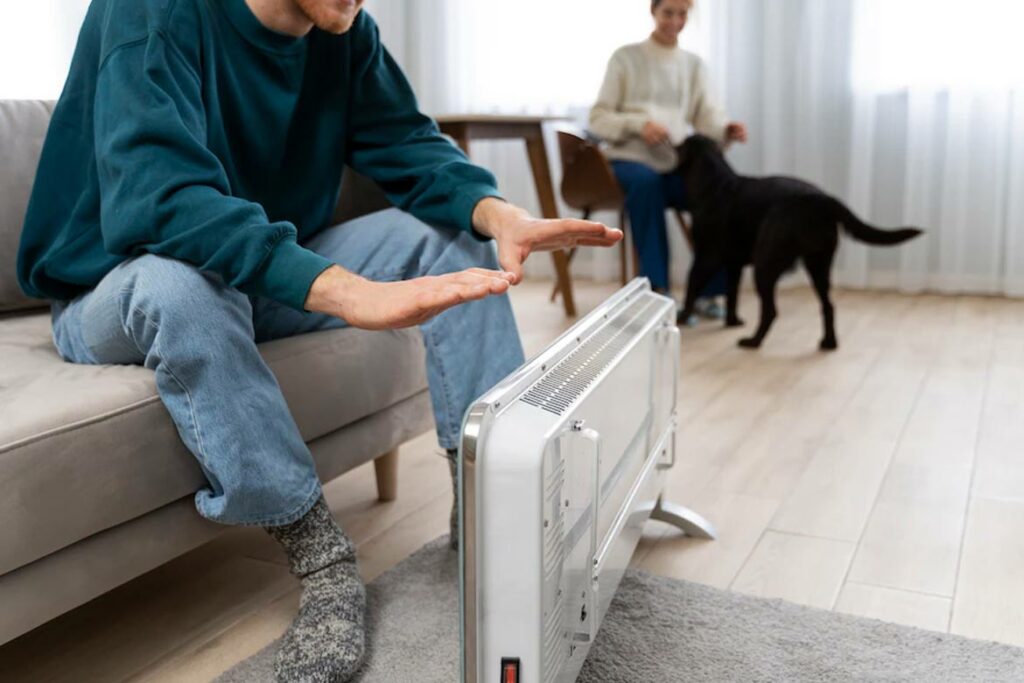During winter, when you get out of the shower, what is the first thing you do? Well most of us, probably turn on the electric heater as we get ready for the day.
Isn’t there nothing more cosy and warm than sitting in front of a heater after stepping inside your house after braving the cold winds on your commute? Many of us even sleep with our heaters turned on.
However, if you rely on indoor heaters to keep warm during the winter, we have some bad news for you. Electric heaters, as warm and wonderful as they are, should not be your go-to solution during the winter, and we’re here to explain why.
First understand the type of heaters

Oil/convection heater
Convection heaters are filled with heat and transfer oil to radiate heat from the external surface area. The heater includes a thermostat for temperature control. These heaters are low-maintenance and do not need to be cleaned on a regular basis. When compared to other heaters, the heat from these heaters spreads slowly.
Conduction heating systems
These room heaters distribute heat via a metallic coil that glows when heated electrically. The nearby areas are first heated, which spreads the heat throughout the room.
Heaters with fans
These heaters operate in convection mode and can quickly heat a closed room. However, because a fan is constantly running inside, they are noisy and dangerous to use in moist conditions.
Infrared and radiant heaters
Radiant heaters use infrared rays to provide instant heat. Unlike fan heaters, they use little electricity and operate quietly. Because they heat the objects rather than the air around them, these heaters are ideal for people who suffer from dust allergies.
Here are four reasons why you should turn off the heater for your own good:

Read more: Healthy Lungs: Must include food items in your diet to fight winter pollution
Dry the air inside room
This is the most common issue that arises when using a room heater. The air blown out by the heater or blower dries up natural moisture in the air inside the room. This dry, moisture-free air causes dryness and roughness in your skin. If you have sensitive skin, this could cause itching and redness, as well as infection. Furthermore, if you have a baby, this could cause additional damage to your baby’s sensitive skin and nasal passage. Excessive dryness in infants and babies caused by heater overuse may result in skin rashes and nosebleeds. Here are some prevention tips for common winter diseases.
It raises toxic levels in the home
There are various types of room heaters available in the market, including unvented and vent-free heaters. The vent-free heaters include an in-built chimney that aids in ventilation and keeps the room clean by allowing fresh air to circulate. Unvented heaters emit pollutants such as carbon monoxide into the home, which can cause brain and organ damage in infants. Increased pollutant levels in an enclosed space are also unhealthy for adults; they endanger asthmatics and may cause other respiratory diseases. However, it has not been established that the vent-free variety does not emit pollutants. Here are some wintertime tips for avoiding allergic colds and coughs.
It could result in accidental burns
Heaters enclosed in a non-metallic case can overheat the outer surface if used for an extended period of time. If this is accidentally touched, it can cause severe burns, especially in the elderly and infants. Keep your lenses or spectacles away from the heater as this may change their molecular composition and cause corneal tissue burn or damage when you use them later.
Temperature fluctuations
Keeping your heater at a higher temperature may cause temperature fluctuations when you leave the room. The reason for this is that your body may need time to adjust to the temperature outside the room. This fluctuating temperature may make your immune system work harder, leading to seasonal colds and flu. Overheating in infants can result in a potentially fatal condition known as hyperthermia. Here are the top ten winter tips for you to remember.
Here are a few pointers to keep in mind when using the heater:

Read more: Uric acid Increases in Body During Winter; Avoid these Food Items to Control
- While using the heater, keep a bucket of water in the corner of your room. This will act as a vaporiser, controlling the moisture levels in the air.
- Keep the heater at a reasonable temperature to avoid overheating the room. Check your user manual and follow the instructions to determine the best temperature for your setting.
- Make sure your heater is checked and serviced at least a year by the manufacturer. This ensures that the tubes, coils, and bands are working properly and do not emit additional carbon monoxide into the room.
- Make sure to open your room’s doors and windows to allow for natural ventilation. You can get rid of the pollutant and clean the room naturally this way.
- To beat the winter chills, dress appropriately and don’t rely solely on a heater. This will assist your body in adjusting to the season and your immunity in working appropriately to protect you from seasonal bouts of cold and flu.
- Install the room heater out of reach of children and the elderly.
